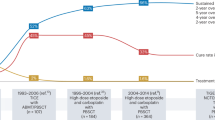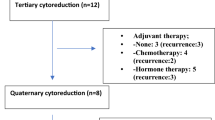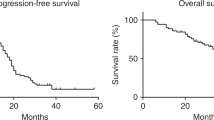Abstract
The aims of the trial were to establish the response rate and determine the toxicity of combination chemotherapy with ifosphamide, vincristine and cisplatin (HOP regimen) in advanced metastatic seminoma and to study the role of post-chemotherapy consolidation treatment. Patients with bulky metastatic non-alpha-fetoprotein-producing seminomas were eligible for this phase II study [serum human chorionic gonadotropin < 200 U l-1 (< 40 ng l-1)] if they presented with abdominal masses > or = 10 cm or had extra-gonadal seminoma or had relapsed after previous radiotherapy. The HOP regimen consisted of four 3-weekly cycles of the following drug combination: ifosphamide (days 1-5, 1.2 mg m-2 day-1), vincristine (day 1, 2 mg) and cisplatin (days 1-5, 20 mg m-2 day-1). Residual masses persisting 6 months after chemotherapy could be considered for consolidation surgery or radiotherapy. Maximal response to the HOP chemotherapy (evaluated at any time) was based on the WHO criteria. The median observation time was 2.5 years (range 1.8-5.5 years). Thirteen institutions treated 42 eligible patients within the study (testicular cancer stage > or = IID, 25; extragonadal, 5; relapse after previous radiotherapy, 12). Two patients were not evaluable for response owing to premature treatment discontinuation. Maximal response was as follows: complete remission (CR), 26 (65%); partial remission (PR) 11 (28%); no change (NC), 2 (5%); progressive disease (PD), 1 (3%). Four patients have died, three from their malignancy (two without previous irradiation and one with prior radiotherapy). The fourth patient died of treatment-related toxicity. The 3 year survival for all 42 eligible patients was 90%. Dose reduction and treatment postponement were necessary in 25 and 14 patients respectively. Ten patients experienced granulocytic fever. Previously irradiated patients tolerated chemotherapy as well as non-irradiated patients. Immediately after HOP chemotherapy a mass persisted in 16 of 17 patients with retroperitoneal masses of > or = 100 mm at presentation. Three of these residual lesions were resected within the following 6 months showing complete necrosis. Four lesions dissolved spontaneously during the first year of follow-up. Nine lesions persisted for > or = 1 year (one after consolidation radiotherapy) without leading to relapse. Four of seven patients with mediastinal lesions achieved CR and three a PR after HOP chemotherapy. The HOP chemotherapy regimen is highly effective in patients with advanced metastatic seminoma or those relapsing after previous radiotherapy, but is associated with a high risk of toxicity, in particular myelotoxicity.
This is a preview of subscription content, access via your institution
Access options
Subscribe to this journal
Receive 24 print issues and online access
$259.00 per year
only $10.79 per issue
Buy this article
- Purchase on Springer Link
- Instant access to full article PDF
Prices may be subject to local taxes which are calculated during checkout
Similar content being viewed by others
Author information
Authors and Affiliations
Consortia
Rights and permissions
About this article
Cite this article
Fosså, S., Droz, J., Stoter, G. et al. Cisplatin, vincristine and ifosphamide combination chemotherapy of metastatic seminoma: results of EORTC trial 30874. Br J Cancer 71, 619–624 (1995). https://doi.org/10.1038/bjc.1995.121
Issue Date:
DOI: https://doi.org/10.1038/bjc.1995.121
This article is cited by
-
Predicted cardiovascular mortality and reported cardiovascular morbidity in testicular cancer survivors
Journal of Cancer Survivorship (2008)



